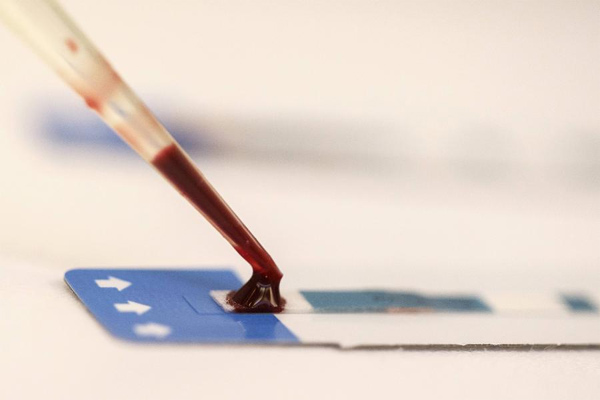Cheap smartphone device detects HIV, syphilis in 15 minutes: study
Updated: 2015-02-05 09:09
(Agencies)
|
||||||||
WASHINGTON - US and Rwandan researchers said Wednesday they have developed a low-cost smartphone accessory that can detect HIV and syphilis from a finger prick of blood in just 15 minutes.
 |
|
A nurse tests a blood sample during a free HIV test at a blood tests party, part of a campaign to prevent HIV infection among male same-sex couples, in Bangkok September 20, 2014. [Photo/Agencies] |
This is the first device that replicates all the functions of a lab-based blood test, and it works by detecting markers of the infectious diseases: HIV antibody, treponemal-specific antibody for syphilis, and non-treponemal antibody for active syphilis infection.
The manufacturing cost of the device is only 34 US dollars, much lower than the 18,000 dollars that current gold standard of diagnostics, known as the enzyme-linked immunosorbent assay (ELISA) needs.
The accessory was recently piloted by health care workers in Rwanda who used it to test blood finger-pricked from 96 patients, many of whom were women at risk for mother-to-child transmission of the sexually transmitted diseases. The health care workers were given only 30 minutes of training on the device.
The researchers said that the device delivered test results displayed on the phone screen within 15 minutes and performed almost as well as the ELISA test.
Nearly all patients preferred it to lab-based tests, which could take up to two or more hours.
"Our work shows that a full laboratory-quality immunoassay can be run on a smartphone accessory," lead author Samuel Sia, associate professor of biomedical engineering at the Columbia University.
"This kind of capability can transform how health care services are delivered around the world," Sia said.
The device, or dongle, can easily connect to a smartphone or computer. It is small and light enough to fit into one hand and draws all the power it needs to run by plugging into a smartphone' s audio jack.
Researchers believed that this lab-on-a-chip device could help scale up early detection of HIV and syphilis, especially in mobile or field clinics.
"Our dongle presents new capabilities for a broad range of users, from health care providers to consumers," Sia said.
"By increasing detection of syphilis infections, we might be able to reduce deaths by 10-fold. And ...we might be able to scale up HIV testing at the community level with immediate antiretroviral therapy that could nearly stop HIV transmissions and approach elimination of this devastating disease," he added.
The work, also comprising researchers from Rwanda Biomedical Center, was published in the US journal Science Translational Medicine.

 Snowboarder towed by a plane reaches speed of 78mph
Snowboarder towed by a plane reaches speed of 78mph
 Business opportunities of 'Year of the Sheep'
Business opportunities of 'Year of the Sheep'
 Italy's new president gets unanimous welcome
Italy's new president gets unanimous welcome
 At least 6 dead in Metro-North train crash
At least 6 dead in Metro-North train crash
 Torturous, beautiful and fun ways of commuting
Torturous, beautiful and fun ways of commuting
 NATO should not provide aid in Ukraine crisis
NATO should not provide aid in Ukraine crisis
 Top 10 rich Chinese on Hurun List 2015
Top 10 rich Chinese on Hurun List 2015
 Things you may not know about Start of Spring
Things you may not know about Start of Spring
Most Viewed
Editor's Picks

|

|

|

|

|

|
Today's Top News
Plane with 53 passengers aboard crashes into river
Chinese swarm for new 10-year US visa
China: UN presidency will be 'fair, open, transparent'
At least six dead as commuter train strikes car outside NYC
Obama tightens rules on use of bulk intelligence data
Former IMF chief Strauss-Kahn on trial over pimping charges
US taking 'fresh look' at weapons for Ukraine
Chinese insurer gets Waldorf OK
US Weekly

|

|








